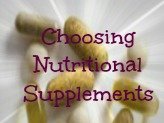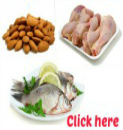Sports Nutrition for every Sportsperson
Sports nutrition is concerned with the type and quantity of food taken by sports persons. If you are a sportsperson, an athlete, or you just love working out, then what you eat will affect your performance.
During exercise, the body uses both glucose (glycogen) and fat in combination to supply the energy demands. The proportion of fats to glucose changes with the intensity of exercise. When a person is exercising below 60 percent of his or her maximal work capacity, fat is used as the primary energy substrate.
As the intensity of exercise increases, so does the percentage of glucose utilization- up to 100 percent during maximal work, which can be sustained for only 2 to 3 minutes.
In general, sports individuals do not require special supplementation or any other special type of diet. Unless the diet is deficient in basic nutrients, no special secret or magic diet will help people perform better or develop faster as a result of what they eat.
As long as the diet is balanced, that is, based on a variety of nutrients from all the basic food groups, sports people do not require additional supplements.
Even in strength training and body building, protein in excess of 20 percent of the total daily caloric intake is not necessary.
The recommended daily protein intake ranges from 8.0 grams per kilogram of body weight for sedentary people to 1.5 grams per kilogram for extremely active individuals.
During prolonged exercise, glycogen is broken down into glucose, which then is readily available to the muscles for energy production. On consecutive days of exhaustive physical training (that is, three or more hours daily), a carbohydrate-rich diet is recommended. This diet often restores glycogen levels in 24 hours.
| Optimize your athletic performance with a healthy energy drink that won't compromise your health in any way. |
In addition, a day of rest often is needed to allow the muscles to recover from glycogen depletion following days of intense training.
Leading sports nutrition studies have found that following an exhaustive workout, eating a combination of carbohydrates and protein within 30 minutes of exercise seems to speed up glycogen storage even more.
Protein intake increases insulin activity, thereby enhancing glycogen replenishment. A 70 percent carbohydrate intake then should be maintained throughout the rest of the day.
Sports Nutrition and Protein
Needs
Protein is an important nutrient in sports nutrition. Ancient sports people ate large amounts of foods and especially meat so as to have enough protein. Today sportsmen meet their protein needs by taking supplements. These proteins are readily available on the market today and they require very little preparation. These are the reasons why supplements have become very popular in sports.
Protein has an important role in sports and any physical activity. Proteins constitute amino acids which manufacture tissues. These proteins are in charge of maintaining and repairing tissue.
Protein are the sources of fuel that is needed by muscles when exercising. They regulate metabolism and a couple of body functions.
Proteins are necessary for muscle growth and muscle repair. You need to eat enough protein so as to recover the energy lost during your training and exercise.
Studies have established that if you eat high quality proteins after training, it enhances your protein synthesis during your recovery period. Taking protein from animal sources will give your enough protein easily. These include meat, fish, eggs, and poultry.
Vegetarians should also get adequate protein intakes every day. This can be achieved by combining various plant sources. Although studies show that vegetable protein foods can boost protein synthesis after training and exercise, it is still not as effective as taking aminal protein sources.
Sports Nutrition for Exercise and Training
Any exercise done for a prolonged period can stress the body. Proper sports nutrition requires that you take adequate nutrients that will give your the energy your body requires.
You can obtain these nutrients by eating a variety of healthy foods from all the food groups. Some of the food sources for the nutrients you need include fish, meat, daily products, beans, vegetables and fruits.
Apart from giving you the commonly known nutrient, these foods also contain a range of other compounds such as the phytochemicals in plant foods, about which we are continually discovering new and exciting information.
Choosing food based sources with these chemicals is a sound idea since it makes use of their interactions within food to enhance bioavailability, and it means that you may also consume other compounds that are yet to be identified.
Studies provide that most athletes can meet the recommended vitamin and mineral intakes from their diets.
On the other hand, some sports persons are at the
risk of getting inadequate nutrients. These individuals require supplementation so that their performance is not affected by lack of enough nutrients. It is also a good practice to seek advice from a qualified expert like sports nutritionist on which supplements to use.








New! Comments
Have your say about what you just read! Leave me a comment in the box below.